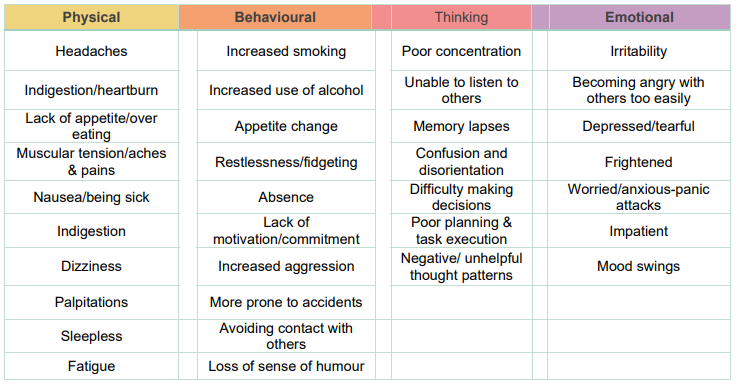Recognising that excessive pressure is affecting your wellbeing is the first step towards being able to make changes. It may be however, that others around you notice the signs that you are being adversely affected by stress, before you realise yourself.
Would you know how to recognise the signs and symptoms of stress? The chart below taken from “Recognising Stress in Others – Signs and Symptoms”[i] groups the signs clearly into 4 categories: Physical, Behavioural, Psychological – ‘Thinking’, and Emotional.
For some people stress may not be the cause, or only cause, for these symptoms, but it is helpful to be aware of the signs – especially when other causes have been investigated and ruled out. It’s also worth noting if these signs are sudden or uncharacteristic for the individual.
The chart can be a useful resource for raising awareness of symptoms that might not necessarily be associated with stress. “The signs and symptoms of stress will vary greatly from person to person as the experience of stress is very individual – it can show up in unpredictable ways, from sudden bursts of aggression to unexplained illness” Derbyshire Community Health Services, NHS Foundation Trust
By familiarising yourself with these symptoms, if you notice persistent and sudden changes in character or behaviour in yourself or others, it could be that signs of stress in yourself or others can be identified sooner.
It is often the behavioural symptoms that are noticed, as they are more obvious, but by this time stress has been going on for many months, maybe even a year or more. [ii]
Speaking out
If you believe that you or a colleague is being affected adversely by stress, the first step is to be encouraged to confide in someone you trust – this might be a GP, a friend or work colleague. With campaigns to encourage people to speak out about mental health in the workplace, admitting you need help/are not coping should no longer be frowned upon. In fact, you might find there is a dedicated member of staff at work trained in mental health issues, just as you would find someone trained in first aid.
Stress is not an indication that people are weak. It is our natural reaction to spending a sustained period of time dealing with more pressure than we have the ability to deal with. [iii]
How to tackle stress
Recognising stress is the start. The NHS provides practical advice on their website: Understanding Stress.[iv] and their “10 Stress Busters”[v] includes useful advice to help you deal with stress. Suggestions range from: taking control, being active, connecting with people and taking the opportunity for some ‘me’ time. Whilst they may not offer a solution, the advice is helpful and practical.
Links:
[i] Derbyshire Community Health Services, NHS Foundation Trust
[ii] https://isma.org.uk/about-stress/how-to-identify-stress
[iii] Derbyshire Community Health Services, NHS Foundation Trust
[iv] https://www.nhs.uk/conditions/stress-anxiety-depression/understanding-stress/
[v] https://www.nhs.uk/conditions/stress-anxiety-depression/reduce-stress/




